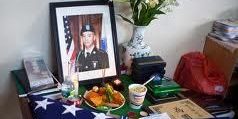Private Danny Chen, a 19-year-old American soldier touring in Afghanistan, was found fatally shot in a guard tower. He had suffered abuse at the hands of his own comrades for several months. Chen’s death may have been a suicide, his desperate attempt to escape the bullying. Or it may have been a homicide, the result of harassment that spun out of control. In either case, the military is a perfect example of an organization based on a hierarchical structure, inherently giving leaders a great deal of power. When Chen’s platoon leaders failed to intervene, the abuse became worse, sealing his fate. This story highlights why moral courage is especially required of those with the authority to protect the vulnerable.
Danny Chen was one of the few Chinese-American soldiers serving in the Army. In letters to his parents, Chen described the kind of racism and humiliation he faced. “Since I’m the only Chinese person here, everyone knows me as Chen. They ask if I’m from China like a few times day. They also call out my name in a goat-like voice sometimes, for no reason.”
The wives of Chen’s military friends have commented on what they saw. One of them noted that he was a different person when he was around his platoon. A normally outgoing man, Chen became withdrawn at work. Another military spouse said she knew that in Army culture it was a bad sign that Chen was being harassed not only by his peers, but even by his superiors.
Through the Organization for Chinese Americans (OCA), Chen’s family has learned what happened just before he died. He was dragged out of bed and across 50 feet of gravel, leaving cuts and bruises across his entire back. Then he was forced to crawl on the ground in full gear, in the heat, while comrades hurled rocks at him. Throughout this ordeal, Chen was taunted with ethnic slurs. Just 30 minutes afterwards, a gunshot was heard coming from the guard tower.
The Army has admitted that higher-ranked officers knew about the abuse leading up to and on Chen’s final day, but that they did nothing. In the military, just one command from a higher-ranked officer to stop the harassment would have been enough to give Chen peace of mind and a chance to serve his country. Instead, by not intervening, his platoon officers effectively encouraged the abuse.
Elizabeth OuYang, president of the New York chapter of OCA, stated it best: “To die not from enemy fire, but from mistreatment by superiors at his own base, is totally unacceptable, uncondonable and must be punished.”
Several soldiers have been charged in Chen’s death, but some have only been charged with dereliction of duty. It is a light reprimand, considering how much power they had to end Chen’s ordeal. This does not send the needed message that all Army officers are responsible for stopping any bullying of, or by, soldiers who directly report to them.
In his famous 1966 speech in South Africa, Robert F. Kennedy stated, “Moral courage is a more rare commodity than bravery in battle…” The circumstances surrounding Danny Chen’s death remind us of that truth.

